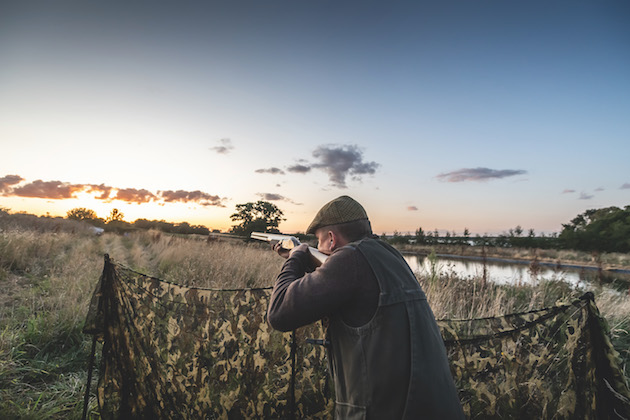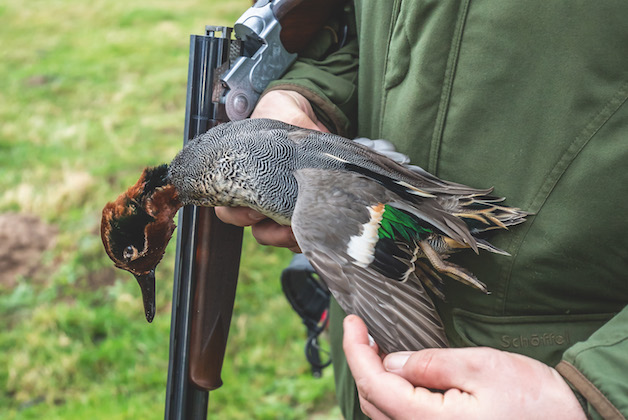The EU is moving towards an outright ban on lead shot
The European Union has taken a major step towards a full ban on lead shot. Wetlands The EU has been…
 Simon Garnham takes a shot from a bale hide
Simon Garnham takes a shot from a bale hide
We were deep in a ditch on the Orkneys. There was a tumbling grey northern sky above us and an icy wind. The peninsula’s greylag goose population was not playing ball. They went to the right of us, they went to the left, they landed on the barley 100 yards away and swirled over the nearby coastline. But they did not demonstrate a willingness to be shot.
So bad did the situation become we were forced to talk to each other. One topic of conversation had dominated discussions among the group, and in the ditch we returned to it — whether it was time to stop shooting lead and change to steel.
On one side was a 6ft 5in Englishman, on the other a Scot who made up for anything he lacked in height with Caledonian pugnacity. The Englishman was a fan of moving over to steel, the Scot was not.
There are other alternatives, but tungsten, bismuth and HEVI-Shot are all much more expensive than lead.
Only steel can begin to match lead for price and for game and pigeon shooting it seems the only really viable alternative.
The argument that it is time to ditch lead is being made almost everywhere that shooters meet — in Gun buses, on social media, at club AGMs and in goose-forsaken Orcadian ditches.
The first thing to remember is that it is illegal to shoot ducks and geese with lead shot in England, and it is illegal to use lead over wetlands in Scotland and Northern Ireland.
The debate is about its use for game and pigeon shooting.

It is illegal to shoot ducks and geese with lead shotHarmful effects of lead?
Lead is toxic and its harmful effects on the central nervous system have been known since Roman times.
It has been banned from water pipes, paint, petrol and children’s toys.
Heavy metals such as lead tend to accumulate in the body’s tissues because animals lack a physiological system for getting rid of them.
Predators and scavengers eating other animals that already have lead in their bodies end up collecting up and storing the metal — sometimes to lethal concentrations.
Ingestion of lead shot is a significant cause of death in wild birds and the latest science shows that even low-level lead poisoning affects birds’ ability to fight off disease.
There is also evidence that eating lead-shot game can have a harmful affect on humans. The recent decision by Waitrose who has insisted all of its game is lead-free from the start of the 2020 shooting season
Waitrose has insisted all of its game is lead-free from the start of the 2020 shooting seasonis a tacit admission that lead is a barrier to marketing game meat more widely.
The case for lead shot is also well known. Its supporters claim it kills more cleanly and at greater range than steel. They also quite rightly point out that many older guns are not proofed for steel shot and the choice of chokes that can be used with it is restricted. These last two points are absolutely correct. Steel shot in your grandfather’s side-by-side is a recipe for disaster and tight chokes with steel shot are not a good idea.
But what of the claims that lead kills more cleanly and at greater range than steel and that it patterns better? There are no end of amateur physicists among shooters who will tell you about the momentum of a pellet versus momentum of a load.
Many of the leading self-appointed experts are American and publish their work via YouTube, where you can educate yourself with endless videos of pumpkins being shot.
Leaving aside theoretical physics and pumpkins, what does experience tell us? This was the centre of the debate between our two wildfowlers. The Scot was reluctant to change to steel because he insisted it did not kill as effectively, the Englishman disagreed. But we do have scientists who have studied the issue.
The lethality of something is the measurement of how effective it is at killing and the lethality of steel and lead shot has been repeatedly compared. The results are surprising.
One line you will often hear about steel shot is that it used to be rubbish but it is now much better, so the time is right to change. The science does not bear this out. Even in the late 1970s, when scientists compared lead and steel shot they found no difference between the two in how well they killed or the range at which they were effective. The conclusion that steel kills as well as lead, does so at long range and does not lead to more wounding is consistent.
Recently, American scientists reviewed the use of two types of steel shot and one type of lead shot on mourning doves. They did not tell hunters whether they were using lead or steel. They then monitored the shooting of more than 1,000 doves. Their conclusions were clear.
“There were no differences in the number of attempts, or number of shots fired among ammunition types,” they reported. “Hunters were unable to distinguish the ammunition type being used in the field, and we detected no relationship between ammunition type and level of hunter satisfaction. Field analyses detected no difference in doves bagged per shot, wounded per shot, bagged per hit, or wounded per hit among the three ammunition types.”

It’s time to move over to steel shot
If your concern is how effectively it will kill, you can move over to steel without concern.
Further regulation of lead shot is coming — the European Commission is already working on EU-wide restrictions. Now that innovative cartridges have removed the contradiction that meant the environmentally conscious cartridge buyer was forced to spray plastic wads across the countryside to avoid using lead, the environmental case in favour of steel is complete.
There is a strong argument that shooting should jump before it is pushed with lead. A voluntary transition away from lead towards steel will allow our representatives to argue that there is no need for a ban — we have taken care of the matter ourselves. This in turn will leave lead in play for those situations where alternatives cannot be used.
There are many guns in circulation that can’t use steel. If the Government feels forced to ban lead to reduce its use, those guns will become almost redundant. If you enjoy using your grandfather’s side-by-side and want your grandchildren to enjoy using their great-great-grandfather’s gun, the best chance is to make a voluntary switch way from lead now for all your other shooting.
The European Union has taken a major step towards a full ban on lead shot. Wetlands The EU has been…
Steel shot wildfowling cartridges: Shooting Super Magnum cartridges is now a reality on our foreshores. Tom’s a fan of them…
I would like to try steel shot for wildfowling in my 2.5in chambered gun, but I have been told by…
That way we can demonstrate that we are a responsible community who only use lead when we really need to.
The art of concealment is the hunter’s superpower and camo plays a huge role
Chris Dalton discovers five garments designed to cope with frosty starts to midday heat.